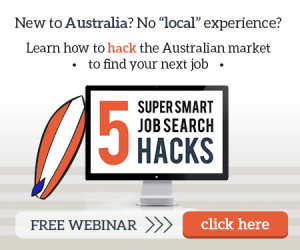 I get a lot of emails from people are new to Australia with job search dilemmas.
I get a lot of emails from people are new to Australia with job search dilemmas.
I struggle to answer all these individually as I receive so many.
This is one reason I have teamed up with Naishadh Gadani who is running the free webinar for job search hacks for skilled migrants, this coming Wednesday 3/9 at 8pm.
Naishadh is the only career marketing expert in Australia who has been a skilled migrant himself. That’s why he’s been able to develop such a successful training program, which we’ll tell you about shortly.
Click here to register and find out more about the webinar.
In this webinar, you’ll learn how to:
– find Australian jobs with “no local experience”
– set up your resume to pass the 10 seconds scan test by Australian recruiters
– build up a strong local network to help you find HIDDEN jobs that are not advertised
– market yourself  better on LinkedIn and online in social media in a powerful and genuine way to help jobs come to you
We give you practical examples you can immediately apply to your own individual situation.
Now here are my responses to the most common questions or misconceptions I see about finding a job in Australia.
In no particular order, these are:
1) Should I dumb down my CV and go for a lower level role?
2) I am told I lack local experience, so I have dumbed down my CV, but now I am being told I am over-qualified for a lower level role
3) I am being told I should network, but this only works for locals
4) Karalyn should I go for position a or position b
Here we go:
1) Should I dumb down my CV and go for a lower role?
This is a really difficult question to answer.
How dumb do you go?
I am not saying this to be sarcastic. The real thing to remember here is that often people are given this advice from people who are not qualified to impart it.
Before you decide whether to accept this advice, take a read of this post on how to check the credentials of your recruitment consultant. I wrote this post 4 years ago, and it still stands today. The advice equally applies to other recruiters and well-meaning friends, family and acquaintances.
2) I am told I lack local experience, so I have “dumbed down” my resume, but now I am being told I am over qualified.
This is a common catch 22. No local experience for the roles you did previously, yet over-qualified for the roles that are a step down from what you have done before.
Keep this in mind.
When jobs exist formally and on paper, you are being matched against a set criteria. As employers are risk averse, the safest thing to do is to screen you out against that criteria.
The bottom line is you need to be talking to people as jobs are emerging. One foundation task for any successful job search in Australia is to build up your network. That network can give you better advice, keep you aware of problems that businesses have that may translate into full time jobs, and keep you posted on any roles that come up.
3) Networking does not work, or it only works for people who live here already and already have a network.
This is simply not true.
Firstly we’re in a global market. People move countries all the time. Your start off point networking could simply be looking up and connecting with old colleagues, friends and family on LinkedIn, seeing whom they might know in Australia, then reaching out and asking for some advice on the market here.
There are heaps of other creative ways you can connect with people if you know something about their background and interests, and start off with a point you have in common. Many of Naishadh’s workshop students, who are skilled migrants, have done this successfully.
I know it works as I have seen it work time and time again.
4) Karalyn can you tell me if I should go for position a or position b
I get this question all the time, to which I answer huh?
It’s not actually my job to answer that question. It’s also giving me a power that I should not have over your life or career direction.
Instead of asking someone like me, it would be of more value if you ask yourself, what you’ve enjoyed, what can you do with limited or no major training, what’s being advertised frequently, or in demand, where have other people with similar skill sets to your have found jobs, etc etc etc
The bottom line about all of this, is that your questions are bigger than what can be answered by one outstanding CV and dozens of applications on Seek – which is a place I think people start and stop their job search.
So if you have similar burning questions to these about finding a job in Australia, do come and join us. Click HERE to register.
It’s packed with targeted and useful content around all these issues.
And, it’s part of my NEW job search hacks program where I help people tackle the toughest issues they come up against when looking for jobs.
>>> Click HERE to register, and I look forward to meeting you all there.

 Follow
Follow
{ 0 comments… add one now }